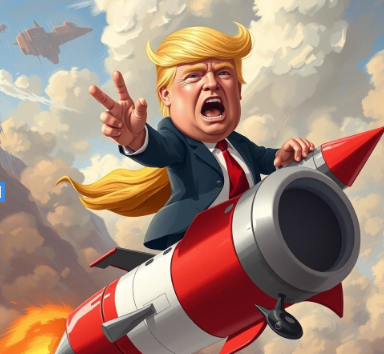$DAX $EURUSD $TSLA
#Trump #Tariffs #Europe #Ukraine #Putin #Meloni #Starlink #Musk #Markets #Trade #Economy #Investing
Former U.S. President Donald Trump’s latest trade tariffs have sent shockwaves through European markets, adding to the region’s economic woes. European stocks, particularly in export-driven industries, saw declines as investors reacted to the escalating tensions between the U.S. and its transatlantic partners. The German DAX index slipped as concerns grew over the automotive, manufacturing, and industrial sectors, which rely heavily on exports to the United States. Trump’s decision to impose hefty tariffs targets key European industries, including steel, automobiles, and luxury goods, prompting fears of retaliatory measures from the European Union. The euro also weakened against the dollar, with the EUR/USD pair edging lower as traders assessed the potential drag on European growth. As global supply chains face disruptions and inflationary pressures persist, European businesses now brace for increased production costs and potential job losses.
Compounding the economic strain, Trump’s recently brokered Ukraine deal with Russian President Vladimir Putin has introduced further geopolitical uncertainty. European leaders voiced deep concerns over the agreement, which some fear could weaken Western support for Ukraine and embolden Russia in its territorial ambitions. Investors have been closely monitoring how potential policy shifts will impact European defense spending and energy supplies. The energy market, in particular, reacted with volatility amid speculation that European nations may have to reconsider energy security measures. Natural gas futures fluctuated as some analysts speculated that Putin’s leverage in negotiations could lead to reduced energy flows to Europe, a scenario that would reignite fears of an energy crisis similar to the one seen in 2022.
Meanwhile, in Italy, Prime Minister Giorgia Meloni’s recent dealings with Elon Musk’s Starlink project have generated political and financial debate. The Italian government has shown interest in integrating Musk’s satellite internet into its infrastructure, a move that could provide better connectivity across the country, particularly in remote areas. However, concerns have been raised about the political and regulatory implications of collaborating with a private entity as influential as Musk’s SpaceX. European telecommunications stocks saw mixed reactions, with some investors questioning the impact on domestic providers. Furthermore, the potential reliance on Starlink for critical communications infrastructure raises questions about sovereignty, data security, and regulatory oversight within the European Union.
As these developments unfold, market uncertainty looms large across multiple sectors. Traders and analysts are keeping a close eye on policy responses from the European Commission, as well as potential retaliatory trade measures from key EU economies such as Germany and France. Given the heightened volatility, investors have been positioning themselves defensively, with some opting for safer assets, such as gold and government bonds, while others hedge against potential currency fluctuations in the foreign exchange markets. The combination of escalating trade tensions, geopolitical uncertainty, and regulatory scrutiny continues to weigh on European equities, raising concerns about economic resilience and growth prospects heading into the second half of the year.







Comments are closed.